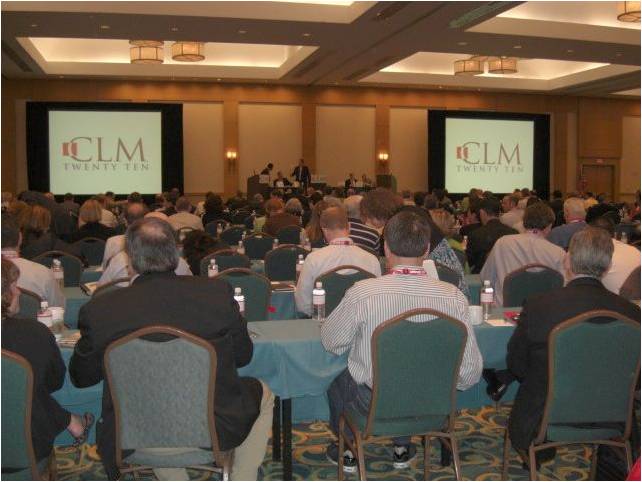Council on Litigation Management (CLM) Annual Conference-a report from Jeff Jinnett

On March 25th, I participated in a panel presentation entitled “The Evidence Lifecycle Management Standard for Early Case Assessment and Beyond” at the Council on Litigation Management (CLM) [1] Annual Conference. My panel was sponsored by WorkProducts, a key Microsoft partner offering solutions in the electronic discovery space [2]. Steve Lilley, the CEO of WorkProducts, served as the moderator of the panel and I was joined on the panel by Michael Lackey, a senior litigation partner at Mayer Brown who chairs the law firm’s Automated Practice Support Group [3] and by Pete Pepiton [4], an attorney /ediscovery consultant and former EDiscovery Solutions Director at CA. Attendance at the CLM conference reportedly was higher than last year’s attendance by several hundred attendees. My guess is that the increasing complexity and cost of ediscovery is one of the reasons for the increase in attendance at the conference over last year. In addition, new ediscovery case decisions that significantly change the compliance landscape also spur the need for information and advice easily found at industry conferences. For example, at our panel presentation (which we presented twice that day), we encountered a very lively Q&A with our audience, most of whom were attorneys. One hot topic was Judge Shira Scheindlin’s recent Southern District of New York decision in the Pension Committee of the University of Montreal Pension Plan case [5].
As one commentator noted:
“The decision has garnered attention both because it establishes a useful analytical framework for the imposition of discovery sanctions and because – especially in its original form – it contained some sweeping pronouncements that could be lifted out of the factual context of the case to suggest a more ‘absolutist,’ as opposed to ‘proportionate,’ approach to defining discovery obligations, running somewhat contrary to many of the more recent opinions in this area.” [6]
Like many opinions in the ediscovery space, the opinion raises a number of troubling technology questions. For example, Judge Scheindlin states in her opinion that:
“Possibly after October, 2003, when Zubulake IV was issued, and definitely after July, 2004, when the final relevant Zubulake opinion was issued, the failure to issue a written litigation hold constitutes gross negligence because that failure is likely to result in the destruction of relevant information.”
Our panel noted that it has become increasingly likely that in the future, records management systems may become enterprise-wide and substantially automated. Therefore, at some point in the future, litigation holds would be imposed through means of technology, rather than by issuing litigation hold notices, with the holds on “electronically stored information (ESI)” being imposed manually. At that time, would such an automated litigation hold system be deemed evidence of gross negligence under Judge Scheindlin’s Pension Plan ruling? Questions such as these underscore the need for litigation counsel to coordinate closely with the company’s information technology department in order to assure that the IT systems used for litigation support comply with applicable ediscovery laws, standards and best practices.
....................................................
[1] See https://www.litmgmt.org/.
[2] See https://www.workproducts.com/.
[3] See https://www.mayerbrown.com/lawyers/profile.asp?hubbardid=L831578732.
[4] See https://twitter.com/PetePepiton.
[5] See the original decision entitled “Zubulake Revisited: Six Years Later” at https://www.law.georgetown.edu/cleblog/assets/content//documents/Pension%20Committee.pdf and the amended decision at https://www.law.georgetown.edu/cleblog/assets/content//documents/05cv9016-january-15-2010-amending-order.pdf.
[6] See https://www.law.georgetown.edu/cleblog/post.cfm/zubulake-revisited-creates-a-stir.